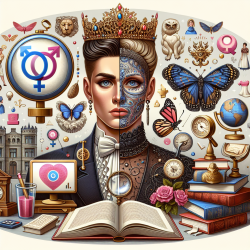Introduction
The world of special education is vast and complex, with many facets that educators and practitioners must navigate. One area that has seen significant discussion and controversy is the understanding of transgender identities, particularly in relation to the research and theories presented in "The Man Who Would Be Queen" by J. Michael Bailey. This blog aims to explore the key takeaways from the controversy surrounding this book and how practitioners can use these insights to improve their skills and approaches when working with transgender students.
The Controversy Explained
Published in 2003, Bailey's book explores the science of gender identity and transsexualism, drawing on the work of sexologist Ray Blanchard. The book's portrayal of male-to-female (MTF) transsexuals, particularly its focus on autogynephilia—a term used to describe a male's propensity to be sexually aroused by the thought of himself as a woman—has been a focal point of contention. Many in the transgender community, as well as some academics, have criticized the book for its perceived insensitivity and potential to harm transgender individuals by misrepresenting their experiences and identities.
Key Insights for Practitioners
- Understanding Diverse Perspectives: The controversy highlights the importance of recognizing and respecting diverse perspectives within the transgender community. Practitioners should be aware that not all transgender individuals identify with or accept the concept of autogynephilia, and they should approach each case with sensitivity and openness.
- Importance of Evidence-Based Practice: The backlash against Bailey's book underscores the need for evidence-based practice in education and therapy. Practitioners should ensure that their approaches are informed by the latest research and are open to revisiting and revising their methods as new evidence emerges.
- Engaging in Continuous Learning: The field of gender identity is rapidly evolving, and ongoing education is crucial. Attending conferences, reading current publications, and participating in webinars can help practitioners stay informed about the latest developments and debates in the field.
- Fostering Inclusive Environments: Creating a supportive and inclusive environment for transgender students is essential. This includes using correct pronouns, providing access to appropriate facilities, and implementing policies that protect against discrimination and harassment.
Encouraging Further Research
The controversy surrounding "The Man Who Would Be Queen" also serves as a call to action for further research into transgender identities and experiences. Practitioners and researchers alike are encouraged to explore these topics with a focus on inclusivity and respect for individual narratives. By doing so, they can contribute to a more comprehensive and nuanced understanding of gender identity that benefits all students.
Conclusion
In conclusion, the discussions and debates sparked by Bailey's book offer valuable lessons for practitioners working with transgender students. By embracing diverse perspectives, committing to evidence-based practice, and fostering inclusive environments, educators and therapists can better support the needs of transgender individuals. As the field continues to evolve, ongoing research and dialogue will be essential in shaping effective and compassionate approaches to education and therapy.
To read the original research paper, please follow this link: The Controversy Surrounding The Man Who Would Be Queen: A Case History of the Politics of Science, Identity, and Sex in the Internet Age.










